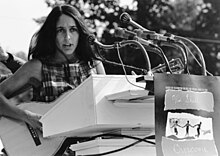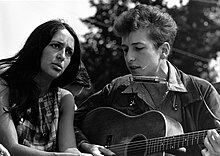Joan Baez
[10] On her later albums she has found success interpreting the work of more recent songwriters, including Ryan Adams, Josh Ritter, Steve Earle, Natalie Merchant, and Joe Henry.
Baez's acclaimed songs include "Diamonds & Rust" and covers of Phil Ochs's "There but for Fortune" and the Band's "The Night They Drove Old Dixie Down".
The Baez family converted to Quakerism during Joan's early childhood, and she has continued to identify with the tradition, particularly in her commitment to pacifism and social issues.
[25] Owing to her father's work with UNESCO, their family moved many times, living in towns across the U.S. as well as in England, France, Switzerland, Spain, Canada, and the Middle East, including Iraq.
After graduating from high school in 1958, Baez and her family moved from the San Francisco area to Boston, Massachusetts, after her father accepted a faculty position at MIT.
The trio sang solos and duets and a family friend designed the album cover, which was released on Veritas Records that same year as Folksingers 'Round Harvard Square.
[42] Gibson invited Baez to perform with him at the 1959 Newport Folk Festival, where they sang two duets, "Virgin Mary Had One Son" and "We Are Crossing Jordan River".
Robert Shelton, folk critic of the New York Times, praised the concert, saying, "That superb soprano voice, as lustrous and rich as old gold, flowed purely all evening with a wondrous ease.
From the early to the mid-1960s, Baez emerged at the forefront of the American roots revival, where she introduced her audiences to the then-unknown Bob Dylan and was emulated by artists such as Judy Collins, Emmylou Harris, Joni Mitchell, and Bonnie Raitt.
She delivered Vanguard one last success with the gold-selling album Blessed Are... (1971), which included a top-ten hit in "The Night They Drove Old Dixie Down", her cover of the Band's signature song.
This song was based on the Pakistani army crackdown on unarmed sleeping Bengali students at Dhaka University on March 25, 1971, which ignited the prolonged nine-month Bangladesh Liberation War.
[57] Gracias a la Vida (1974) (the title song written and first performed by Chilean folk singer Violeta Parra) followed and was a success in both the U.S. and Latin America.
Flirting with mainstream pop music as well as writing her own songs for Diamonds & Rust (1975), the album became the highest selling of Baez's career and included a second top-ten single in the form of the title track.
Baez also played a significant role in the 1985 Live Aid concert for African famine relief, opening the U.S. segment of the show in Philadelphia, Pennsylvania.
In 1993, at the invitation of Refugees International and sponsored by the Soros Foundation, she traveled to the war-torn Bosnia and Herzegovina region of former-Yugoslavia in an effort to help bring more attention to the suffering there.
In October 1993, Baez became the first major artist to perform in a professional concert presentation on Alcatraz Island (a former U.S. federal prison) in San Francisco, California, in a benefit for her sister Mimi's Bread and Roses organization.
In September 2006, Baez contributed a live, retooled version of her classic song "Sweet Sir Galahad" to a Starbucks's exclusive XM Artist Confidential album.
In February 2007, Proper Records reissued her 1995 live album Ring Them Bells, which featured duets with artists ranging from Dar Williams and Mimi Fariña to the Indigo Girls and Mary Chapin Carpenter.
[71] On April 30, 2019, Baez told Rolling Stone that she had been approached to perform at the Woodstock 50 festival, but had turned the offer down for "it was too complicated to even get involved in" and her "instincts" were telling her "no".
[74] In 1956, Baez first heard Martin Luther King Jr. speak about nonviolence, civil rights and social change in a speech that brought tears to her eyes.
Her performance of "We Shall Overcome", the civil rights anthem written by Pete Seeger and Guy Carawan, at the 1963 March on Washington for Jobs and Freedom permanently linked her to the song.
[77] Her recording of the song "Birmingham Sunday" (1964), written by her brother-in-law, Richard Fariña, was used in the opening of 4 Little Girls (1997), Spike Lee's documentary film about the four young victims killed in the 1963 16th Street Baptist Church bombing.
In December 2005, Baez appeared and sang "Swing Low, Sweet Chariot" at the California protest at the San Quentin State Prison against the execution of Tookie Williams.
In 1978, she performed at several benefit concerts to defeat the Briggs Initiative, which proposed banning openly gay people from teaching in public schools in California.
[107] In the summer of 2004, Baez joined Michael Moore's "Slacker uprising Tour" on American college campuses, encouraging young people to get out and vote for peace candidates in the upcoming presidential election.
The women, in addition to many other activists and celebrities, were protesting the imminent eviction of the community farmers and demolition of the site, which is the largest urban farm in the state.
In "To Bobby", written in 1972, she urged Dylan to return to political activism, while in "Diamonds & Rust", the title track from her 1975 album, she revisited her feelings for him in warm, yet direct terms.
Baez implied when speaking about the connection to "Diamonds and Rust" that "Lily, Rosemary and the Jack of Hearts" is, at least in part, a metaphor for Dylan's view of his relationship with her.
[135] After finding a pacifist preacher and a church outfitted with peace signs and writing a blend of Episcopalian and Quaker wedding vows, Baez and Harris married in New York City on March 26, 1968.
After the wedding, Baez and Harris moved into a home in Los Altos Hills, California on 10 acres (4.0 hectares) of land called Struggle Mountain, part of a commune, where they tended gardens.









